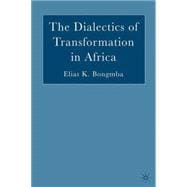
What is included with this book?
Elias K. Bongmba is Associate Professor of Religious Studies, Rice University.
| PREFACE | viii | ||||
| INTRODUCTION | 1 | (8) | |||
| CHAPTER 1 DEFINING THE HUMAN CRISIS IN AFRICA | 9 | (30) | |||
|
10 | (7) | |||
|
17 | (6) | |||
|
23 | (5) | |||
|
28 | (11) | |||
| CHAPTER 2 THE GENESIS OF THE AFRICAN CRISIS: THE MANIFESTATION OF A POLITICAL WILL | 39 | (24) | |||
|
40 | (3) | |||
|
43 | (3) | |||
|
46 | (6) | |||
|
52 | (3) | |||
|
55 | (8) | |||
| CHAPTER 3 RECOVERY IDEAS I: ECONOMIC ADJUSTMENTS, DEMOCRACY, AND GOVERNANCE | 63 | (32) | |||
|
63 | (6) | |||
|
69 | (3) | |||
|
72 | (4) | |||
|
76 | (8) | |||
|
84 | (2) | |||
|
86 | (4) | |||
|
90 | (5) | |||
| CHAPTER 4 RECOVERY IDEAS 2: CIVIL SOCIETY AND THE AFRICAN RENAISSANCE | 95 | (28) | |||
|
95 | (7) | |||
|
102 | (4) | |||
|
106 | (1) | |||
|
107 | (6) | |||
|
113 | (2) | |||
|
115 | (8) | |||
| CHAPTER 5 TOWARD AN INTERSUBJECTIVE POLITICAL COMMUNITY IN AFRICA | 123 | (22) | |||
|
124 | (6) | |||
|
130 | (3) | |||
|
133 | (4) | |||
|
137 | (2) | |||
|
139 | (6) | |||
| CHAPTER 6 RETHINKING GENDER RELATIONS: A PRELIMINARY INVESTIGATION | 145 | (22) | |||
|
146 | (2) | |||
|
148 | (11) | |||
|
159 | (8) | |||
| CHAPTER 7 RETHINKING POWER IN AFRICA: RELIGIOUS AND THEOLOGICAL PERSPECTIVES | 167 | (32) | |||
|
168 | (3) | |||
|
171 | (2) | |||
|
173 | (4) | |||
|
177 | (2) | |||
|
179 | (1) | |||
|
180 | (3) | |||
|
183 | (1) | |||
|
184 | (1) | |||
|
185 | (1) | |||
|
186 | (1) | |||
|
186 | (1) | |||
|
187 | (2) | |||
|
189 | (5) | |||
|
194 | (2) | |||
|
196 | (3) | |||
| CONCLUSION: BEYOND PESSIMISM TO OPTIMISM: IN LOVE WITH AFRICA | 199 | (14) | |||
| NOTES | 213 | (54) | |||
| BIBLIOGRAPY | 267 |
The New copy of this book will include any supplemental materials advertised. Please check the title of the book to determine if it should include any access cards, study guides, lab manuals, CDs, etc.
The Used, Rental and eBook copies of this book are not guaranteed to include any supplemental materials. Typically, only the book itself is included. This is true even if the title states it includes any access cards, study guides, lab manuals, CDs, etc.